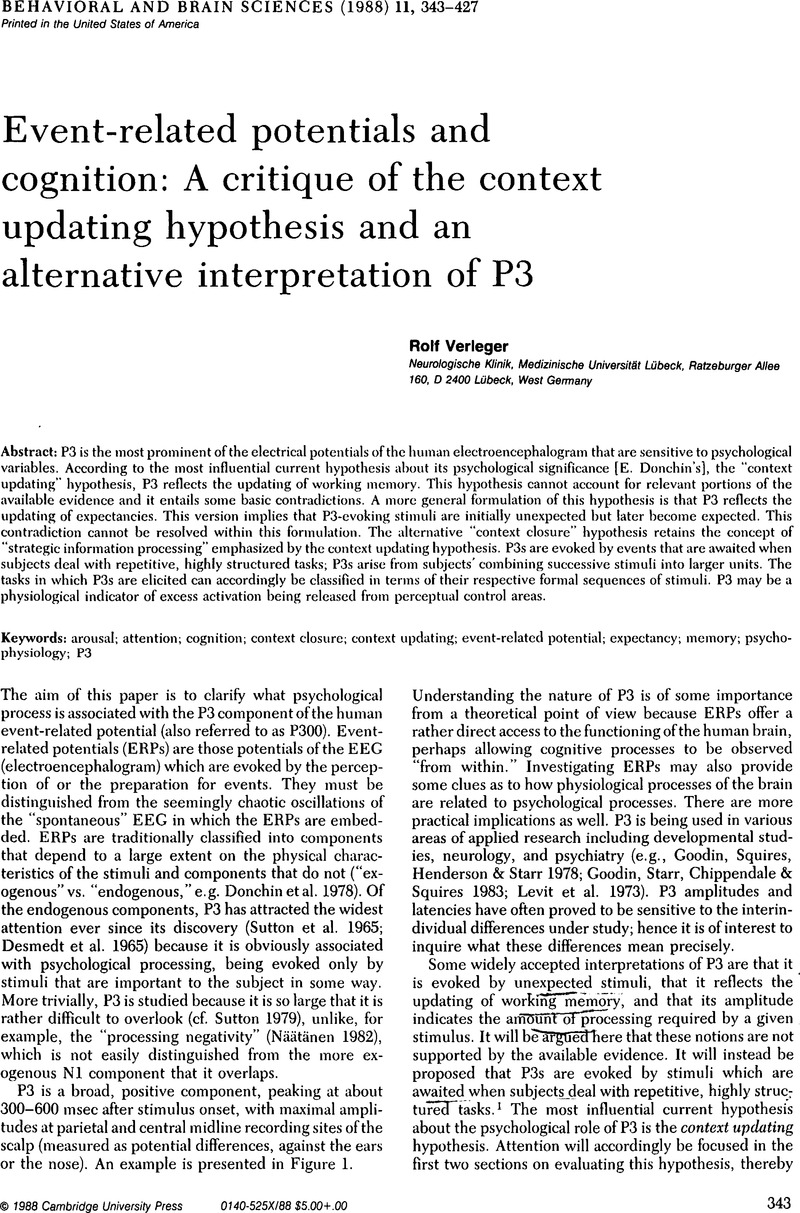Crossref Citations
This article has been cited by the following publications. This list is generated based on data provided by Crossref.
Uhl, F.
Franzen, P.
Serles, W.
Lang, W.
Lindinger, G.
and
Deecke, L.
1990.
Anterior Frontal Cortex and the Effect of Proactive Interference in Paired Associate Learning: A DC Potential Study.
Journal of Cognitive Neuroscience,
Vol. 2,
Issue. 4,
p.
373.
Claverie, B
and
N'Kaoua, B
1991.
P3on et P3off dans un protocole visuel passif.
Neurophysiologie Clinique/Clinical Neurophysiology,
Vol. 21,
Issue. 1,
p.
15.
Stenberg, Georg
1994.
Extraversion and the P300 in a visual classification task.
Personality and Individual Differences,
Vol. 16,
Issue. 4,
p.
543.
Starr, A.
Sandroni, P.
and
Michalewski, H.J.
1995.
Readiness to respond in a target detection task: pre- and post-stimulus event-related potentials in normal subjects.
Electroencephalography and Clinical Neurophysiology/Evoked Potentials Section,
Vol. 96,
Issue. 1,
p.
76.
Altenmüller, E.
1996.
Evozierte Potentiale.
p.
557.
Bakay, E.P
Marton, M
Rigó, P
and
Balázs, L
1998.
Responses to irrelevant probes during task-induced negative and positive shifts1Part of this material was presented at the 38. Congress of the German Psychological Association in Trier by Bakay et al., 1992.1.
International Journal of Psychophysiology,
Vol. 28,
Issue. 3,
p.
249.
Ergenoglu, Tolgay
Demiralp, Tamer
Beydagi, Hüseyin
Karamürsel, Sacit
Devrim, Müge
and
Ermutlu, Numan
1998.
Slow cortical potential shifts modulate P300 amplitude and topography in humans.
Neuroscience Letters,
Vol. 251,
Issue. 1,
p.
61.
Muñoz‐Ruata, J.
Gómez‐Jarabo, G.
Martín‐Loeches, M.
and
Martínez‐Lebrusant, L.
2000.
Neurophysiological and neuropsychological differences related to performance and verbal abilities in subjects with mild intellectual disability.
Journal of Intellectual Disability Research,
Vol. 44,
Issue. 5,
p.
567.
Gerloff, C.
2005.
Evozierte Potenziale.
p.
499.
He, Biyu J.
and
Raichle, Marcus E.
2009.
Response to Koch: Elaborations on the SCP hypothesis.
Trends in Cognitive Sciences,
Vol. 13,
Issue. 9,
p.
368.
Lange, Kathrin
2012.
The temporal orienting P3 effect to non-target stimuli: Does it reflect motor inhibition?.
Biological Psychology,
Vol. 89,
Issue. 2,
p.
433.
Ng, Kwun Kei
and
Penney, Trevor B.
2014.
Neurobiology of Interval Timing.
Vol. 829,
Issue. ,
p.
187.



